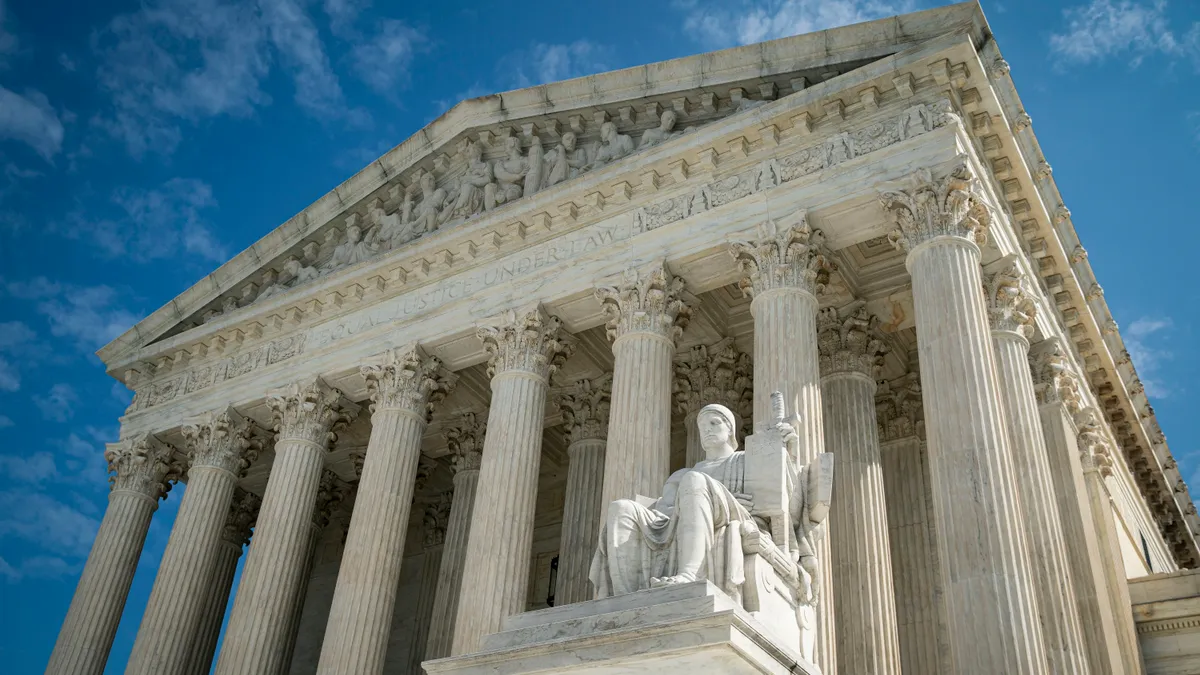It’s probably no exaggeration to say the most watched comments from the Supreme Court’s Tuesday hearing of oral arguments in a case concerning the constitutionality of the Consumer Financial Protection Bureau’s funding are those of the bench’s conservative justices.
Challenges to the bureau’s authority have typically fallen along party lines. When the Supreme Court ruled in 2020 that the president could fire the CFPB’s director “at will” rather than “for cause,” the decision was 5-4, along party lines.
Fast-forward three years, and that gap has widened to 6-3. And in the meantime, the fight against the CFPB has deepened. The 5th U.S. Circuit Court of Appeals ruled last year that because the CFPB receives funds from the Federal Reserve and not Congress, its funding is unconstitutional. The appeals court’s three judges are all Trump appointees. The 2nd U.S. Circuit Court of Appeals, by contrast, found the CFPB’s funding structure constitutional, in a March ruling, setting up the Supreme Court showdown.
The level of skepticism Tuesday from the Supreme Court conservative-leaning voices may come as a surprise to some observers.
Clarence Thomas
“I get your point that this is different, that it’s unique, that it’s odd, that they’ve never gone this far,” Thomas, a George H.W. Bush appointee, told Noel Francisco, a lawyer arguing on behalf of the case’s two payday-lending trade group plaintiffs, according to The Wall Street Journal. “But not having gone this far is not a constitutional problem.”
Francisco argues that because the CFPB’s director asks the Federal Reserve — and not Congress — for funding, that violates the appropriations clause of the Constitution.
“Congress has not determined the amount that this agency should be spending,” Francisco said, according to Bloomberg. “Instead it has delegated to the director the authority to pick his own appropriation subject only to an upper limit that’s so high, it’s rarely meaningful.”
At issue, Congress in 2010 authorized the CFPB to draw funding each year from the Fed up to a $785.4 million inflation-adjusted cap it has never hit, according to a budget document seen by The Wall Street Journal. The agency received $641.5 million this year, according to Bloomberg.
Francisco argued the crux of the funding structure lay in the timing.
“Look, everybody knew what was going on in 2010,” Francisco argued, according to The Wall Street Journal.
The Democrats who had a majority in Congress at that time “wanted to insulate a future CFPB from political pressure from a future Congress” that contained a Republican majority, Francisco said.
Francisco, incidentally, served as solicitor general during the Trump administration.
Brett Kavanaugh
“I certainly agree that, as originally constructed, the CFPB had, in my view, a massive constitutional flaw in the single director who was protected by for-clause removal, but that, of course, was fixed and addressed in Seila Law, and now it’s not independent at all,” Kavanaugh said, according to Bloomberg. “It’s under the direct supervision and control of the president.”
Here, Kavanaugh name-checked the 2020 “at-will” case. But, Francisco argued, when it comes to CFPB funding, Congress cedes control to the executive branch.
"Congress can't say to the president, spend anything you want," Francisco said, according to American Banker. "Congress has to determine a set amount that it plans to be spending.”
The structure as it is now sets up the CFPB to dip into a “perpetual” stream of funding, Francisco argued. But Kavanaugh dismissed that notion.
“Congress could change it tomorrow, and there’s nothing perpetual or permanent about this,” the justice said, according to Reuters.
Amy Coney Barrett
"I think we're all struggling to figure out, then, what's the standard that you would use," Barrett asked Francisco, according to Reuters. "How do you decide how much is too much or how specific is specific enough?”
Another conservative voice floated a hypothetical figure.
Neil Gorsuch
"Could it be a trillion dollars?" Gorsuch asked, according to American Banker.
Another of the court’s conservatives grounded the hypothetical with comparison to another agency.
Samuel Alito
"Let's take the [Federal Trade Commission], which I think had a budget of $430 million,” Alito said, according to American Banker. “Let’s say there's a law that allocates forever up to $1 billion adjusted for inflation to the FTC to use as the FTC seems fit. Would that be consistent with the appropriations clause?”
Alito said he wanted Francisco to demonstrate his understanding of the limiting clause.
"I think the hypothetical would effectively be a standing uncapped appropriation because, of course, the FTC would never reach that amount,” Francisco replied, according to American Banker.
One of the court’s more liberal voices tied the argument back to the agency that supplies the CFPB’s funding.
Elena Kagan
"It sure seems that on your view, the Federal Reserve would also be unconstitutional," Kagan said, according to Reuters.
Elizabeth Prelogar, the solicitor general arguing on behalf of the Biden administration, cited examples of similar funding structures applied to agencies past and present.
"This is not novel," Prelogar said, noting that Congress set up the U.S. Customs Service in 1789 to have “a standing, uncapped source of funding” from revenues the agency collected. Congress has also used a broad delegation authority to set funding levels the U.S. Postal Service and the U.S. Mint, she argued, adding that other financial regulators including the Federal Reserve Board, Office of the Comptroller of the Currency and Federal Deposit Insurance Corp. employ a "materially identical" structure.
Not every conservative justice was sold.
John Roberts
The chief justice called Prelogar's view of congressional appropriations power "aggressive," according to Reuters, adding that her argument could undermine separation of powers when the executive and legislative branches are both controlled by the same political party.
But other justices focused on funding amount and intent.
Ketanji Brown Jackson
"Where in the text of the appropriations clause does it say the government had to fix the amount?" Brown Jackson asked Francisco, according to American Banker.
“The founders said we are trying to give to the legislature the authority to make the determination of how the government is funded, period,” she added, according to The Wall Street Journal. “You’re saying a provision of the Constitution is unconstitutional.”
A ruling in the CFPB case is expected before July.





















